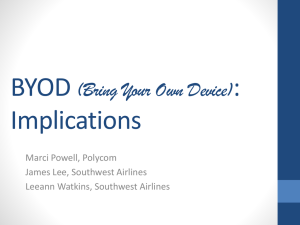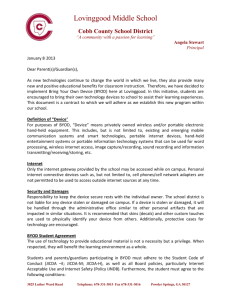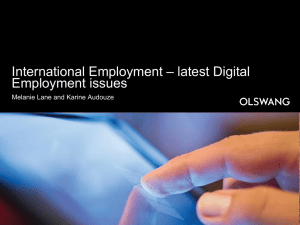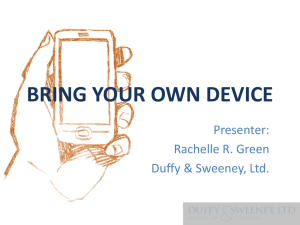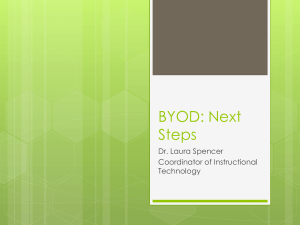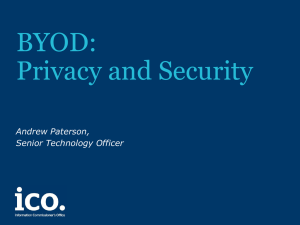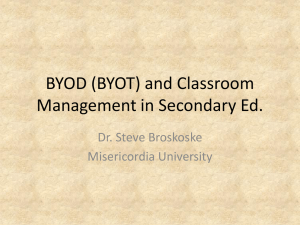Preparing for the Opportunities and Challenges of BYOD
advertisement
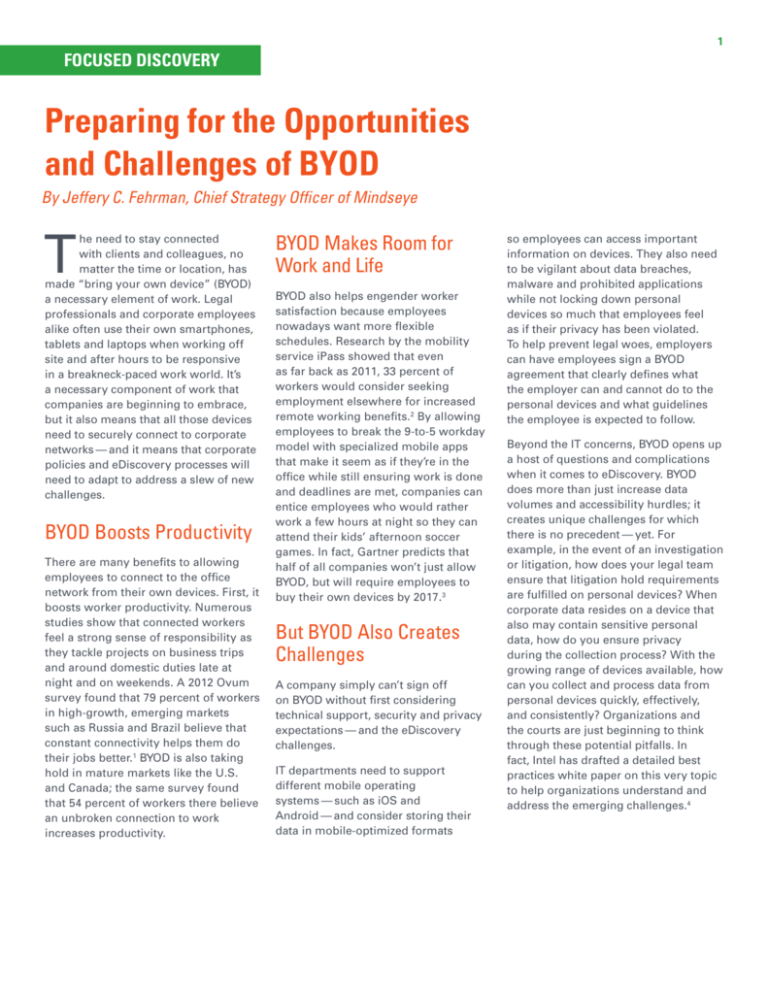
1 FOCUSED DISCOVERY Preparing for the Opportunities and Challenges of BYOD By Jeffery C. Fehrman, Chief Strategy Officer of Mindseye T he need to stay connected with clients and colleagues, no matter the time or location, has made “bring your own device” (BYOD) a necessary element of work. Legal professionals and corporate employees alike often use their own smartphones, tablets and laptops when working off site and after hours to be responsive in a breakneck-paced work world. It’s a necessary component of work that companies are beginning to embrace, but it also means that all those devices need to securely connect to corporate networks — and it means that corporate policies and eDiscovery processes will need to adapt to address a slew of new challenges. BYOD Boosts Productivity There are many benefits to allowing employees to connect to the office network from their own devices. First, it boosts worker productivity. Numerous studies show that connected workers feel a strong sense of responsibility as they tackle projects on business trips and around domestic duties late at night and on weekends. A 2012 Ovum survey found that 79 percent of workers in high-growth, emerging markets such as Russia and Brazil believe that constant connectivity helps them do their jobs better.1 BYOD is also taking hold in mature markets like the U.S. and Canada; the same survey found that 54 percent of workers there believe an unbroken connection to work increases productivity. BYOD Makes Room for Work and Life BYOD also helps engender worker satisfaction because employees nowadays want more flexible schedules. Research by the mobility service iPass showed that even as far back as 2011, 33 percent of workers would consider seeking employment elsewhere for increased remote working benefits.2 By allowing employees to break the 9-to-5 workday model with specialized mobile apps that make it seem as if they’re in the office while still ensuring work is done and deadlines are met, companies can entice employees who would rather work a few hours at night so they can attend their kids’ afternoon soccer games. In fact, Gartner predicts that half of all companies won’t just allow BYOD, but will require employees to buy their own devices by 2017.3 But BYOD Also Creates Challenges A company simply can’t sign off on BYOD without first considering technical support, security and privacy expectations — and the eDiscovery challenges. IT departments need to support different mobile operating systems — such as iOS and Android — and consider storing their data in mobile-optimized formats so employees can access important information on devices. They also need to be vigilant about data breaches, malware and prohibited applications while not locking down personal devices so much that employees feel as if their privacy has been violated. To help prevent legal woes, employers can have employees sign a BYOD agreement that clearly defines what the employer can and cannot do to the personal devices and what guidelines the employee is expected to follow. Beyond the IT concerns, BYOD opens up a host of questions and complications when it comes to eDiscovery. BYOD does more than just increase data volumes and accessibility hurdles; it creates unique challenges for which there is no precedent — yet. For example, in the event of an investigation or litigation, how does your legal team ensure that litigation hold requirements are fulfilled on personal devices? When corporate data resides on a device that also may contain sensitive personal data, how do you ensure privacy during the collection process? With the growing range of devices available, how can you collect and process data from personal devices quickly, effectively, and consistently? Organizations and the courts are just beginning to think through these potential pitfalls. In fact, Intel has drafted a detailed best practices white paper on this very topic to help organizations understand and address the emerging challenges.4 Preparing for the Opportunities and Challenges of BYOD Soon, Everyone will Bring Everything to Work BYOD is just part of a larger evolution toward BYOx (bring your own anything). Some employers are already accommodating employees who want to wear fitness and health monitors and other similar devices (bring your own wearable) — Google Glass can’t be far behind. Employees also want to use public or third-party cloud services for certain tasks (bring your own cloud). And some employees prefer to broadcast their company’s message through social media networks not yet recognized by the employer, so they instead try their own solution (bring your own tools.) The sooner employers embrace BYOD and address its associated IT and eDiscovery challenges, the sooner employees will increase their morale and productivity — and the sooner they will all be ready for BYOx. “24-Hour Workshift: Mobile Employees Work Around the Clock According to New iPass Mobile Workforce Report” (August 23, 2011) 3 CIO: “Half of Companies Will Require BYOD By 2017, Gartner Says” (May 1, 2013) 4 Intel: Mindseye is a powerful and comprehensive eDiscovery solution that helps you move less — but more relevant — data to review by: •Enabling you to quickly •Providing built-in analytics to Unplugged: “BYOD – Research findings released” (November 28, 2012) 2 iPass: Mindseye SUPPORTS COMPLEX EDISCOVERY PROCESSES cull junk data and uncover relevant information through a sophisticated, iterative keyword search End notes 1 CXO 2 “Successful eDiscovery in a Bring-Your-own-Device Environment” (June 2012) help you develop and refine data classifications that are reusable across cases •Presenting data in a way that’s understandable, insightful, and transferable to invested parties •Providing comprehensive reporting capabilities that account for every file input into the system and track whether it was excluded and why •Providing documented evidence of processes to the courts For more information about Mindseye or to request a demo, please visit www.mindseyesolutions.com. Jeff Fehrman has worked for more than 15 years in the electronic evidence and information technology fields. He consults with clients on a variety of topics related to eDiscovery, including business processes, data reduction strategies, litigation preparedness and workflow design. Contact Jeff at jfehrman@mindseyesolutions.com or (571) 483-0639. Discover More. Review Less.® 2301 Columbia Pike | Suite 121 | Arlington, VA 22204 | www.mindseyesolutions.com | 1.888.770.3876
